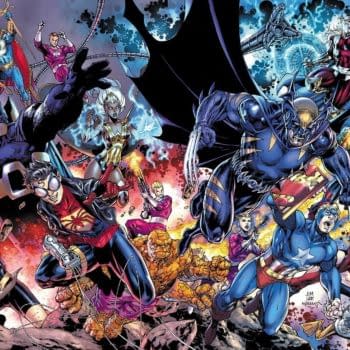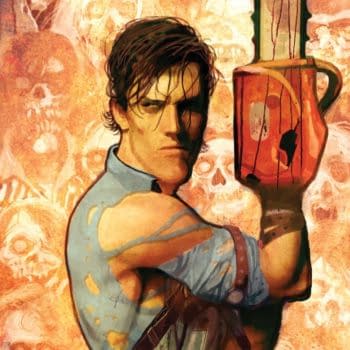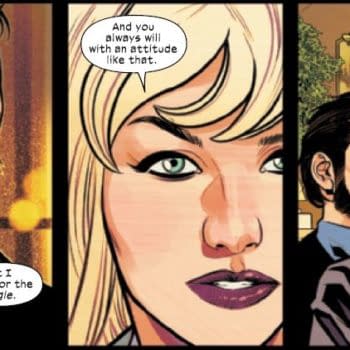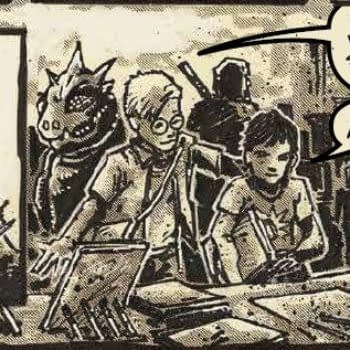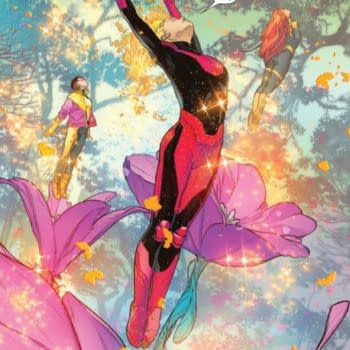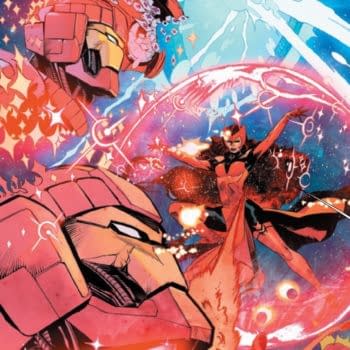Posted in: Recent Updates | Tagged:
Talking To Radical About Muscles, Tattoos, Oh And Comics And Films

Jesse Berger struck me as the thoughtful, considered type. Barry is more the media entity, the powerhouse, the kind of sixty-three year old you don't want to meet in a back alley after you're just insulted his bull mastiff. Stan Lee meets Simon Bisley. Ripped, recently tattoed, he looks the kind of man who's lived a long, hard life and still hellraises it up every weekend. But apparently not.
"Last night I was asleep at nine thirty. And tonight I'm going to try to get to bed for seven…"
With a history in the music industry, it was working on the soundtrack for Judge Dredd that got Barry Levine back into reading comic books. Inspired by the comics he was suddenly reading, he tried to create a major mix of the quirkier bands to match the 2000AD material… but the director pushed for the likes of Survivor over Levine's choice of The Cure, Manic Street Preacher and The Cocteau Twins. Barry Levine was bristling. Working with Acclaim, he got the option for Magnus Robot Fighter off the ground. Only for the project to become I, Robot. But it was working with Fabian Nicieza there that gave him the inspiration behind Radical. Seeing the desire to create comics he loved, with names he admired over everything, then developing them into other media. And a subsequent dalliance with Dark Horse made him realise he really wanted to do this independently. And a stint with Rhythm And Hues gave him a taste for visual effects… mix with comics industry veteran Dave Elliot and entrepreneur Jesse Berger and suddenly there's was access to a whole range of writers and artists and funding to be brought together. Hence Radical.
"Every writer is a frustrated director". Barry is insistent that the writers of Radical comics get the chance to write the first draft of any screenplay based on this comic, with Rick Remender, David Hine and Pete Milligan working on theirs as we speak. Is this a purely altruistic move? Not a bit of it. Barry explains it, "the creatives can't say Hollywood fucked up my comic, they had their shot!" And even if a screenwriter is brought it to develop further drafts, they have more reference material from the original creator to work with, and a greater chance of the writer's ideas and execution making it through.

This attitude towards the art and how it's been presented, has also pushed the move at Radical from the six issue mini-series to the larger albums of work, each issue" being 48 to 72 pages long, giving a better one shot hit and providing better value for money, even as the books go from $2.99 to $4.99. "I learnt a lot from the French" he says and Radical now have a four year deal with one of the biggest graphic novel publishers in the world, Dargaud in France as well as Random House in the US.
This attitude does feel like a substantive difference to other comparable companies, and it's difficult to argue with the look of the work. However, Barry's pride that the Nick Simmons album Incarnate sold out 8000 copies "from an unknown" is hard to justify, even when Barry explains "When I say unknown, I mean not respected in the industry." Certainly having Gene Simmons as a father has helped the sales of the book at Con and he'll be playing at the Hard Rock in San Diego with three members of Kiss, for Radical's big party tonight. "It's going to be the biggest party, Zack Snyder, Harry Knowles, you can come… are you on the list?" Apparently I'm on the list. And Carrot Top will be introducing Gene. Yup, that's right. My head is hurting…
But what is notable for such a company is that whatever "names" Radical use on the books, they are actually doing the work. Tekno and Virgin used a big brand name to get people interested, like Guy Ritchie, John Woo, Neil Gaiman and Leonard Nimoy, but the actual comics were generally written by other people, and it's always felt like a bit of a cheat for the reader. And Barry insists "Plus we're well financed, long term" talking about his Singapore investors, a source of funding that I've heard a number of others talking about jealously over the weekend. Barry boasts that the investor could buy Hawaii. But the company began small, working and living together and working all hours before they received that investment. So the company grew organically rather that try to hit big from the beginning.
Barry sees another difference is the reward to creators, not only for those with creator owned works being represented by the company but, also giving significant slice of profits across media exploitation to their work for hire creators as well. Barry told me that from the expected merchandising deal from Ian Edginton's recent Aladdin work for the company "Ian could retire", even with the the precarious state of the dollar. I pointed out that the pound had crashed against the dollar recently and Barry celebrated, "can we get some more British artists now?"
I ask him how he sees Radical at San Diego next year. He starts by mentioning a bigger booth before pointing out that he expects to be in production on two movies by then, from a current raft of eight scripts each placed with A list directors, expanding into China, developing toylines, before pointing out that the company are currently a year ahead of their own schedule. It's grand, it's bold, but it's a natural progression for the company, and Barry can be very convincing. So I ask him, what would he consider a failure?
"Having to do books we're not happy about, working with writers and artists out of necessity". Barry says that he doesn't care how much he sells he's all about brand building and He. Will. Not. Fail. With those flexing muscles, I didn't feel inclined to argue. Just check his other tattoo…







